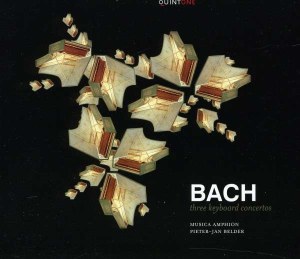 |
 |
|


alternatively
CD: MDT
AmazonUK
AmazonUS
Sound
Samples & Downloads |
Johann Sebastian BACH
(1685-1750)
Concerto for harpsichord, strings and bc in d minor (BWV 1052) [21:30]
Carl Philipp Emanuel BACH (1714-1788)
Concerto for organ, strings and bc in G (Wq 34/H 444) [23:34]
Johann Christoph Friedrich BACH
(?) (1732-1795)
Concerto for keyboard, strings and bc in E flat (BR JCFB C 29)*
[17:47]
 Musica Amphion/Pieter-Jan Belder (harpsichord, fortepiano*, organ)
Musica Amphion/Pieter-Jan Belder (harpsichord, fortepiano*, organ)
rec. 2006, Doopsgezinde Kerk, Deventer, Netherlands. DDD
 QUINTONE Q06001 [62:52]
QUINTONE Q06001 [62:52]
|
|
|
Johann Sebastian Bach has the reputation of being a brilliant,
but rather conservative composer. The latter is true insofar
as counterpoint is concerned and this remained an essential
element in his compositions until the very end of his life.
In other respects he was rather modern. That is certainly the
case in regard to the role of the harpsichord. In Bach's formative
years it was restricted to accompanying instruments or singers.
He was the first to give the harpsichord an independent role
in the ensemble, as his fifth Brandenburg Concerto shows. He
was also the first to compose concertos for harpsichord with
instrumental accompaniment, and even concertos for two, three
and four harpsichords. These date from his time in Leipzig,
and were mostly reworkings of concertos for other scorings probably
written in Cöthen. It is no exaggeration to say that Bach
laid the foundation for a genre which would be one of the most
prominent in the history of Western music: the piano concerto.
His sons followed his example: all of them composed a considerable
number of keyboard concertos. It makes sense to include specimens
of their forays into this genre alongside one of the most brilliant
concertos by their father. The Concerto in d minor (BWV
1052) is generally considered one of Bach's earliest concertos,
originally probably scored for violin. The solo part in its
harpsichord version is technically demanding and the fast movements
contain a considerable amount of drama. I liked the way Pieter-Jan
Belder raises the tension towards the end of these movements.
I would have liked a more differentiated treatment of the tempo,
though; some rubato wouldn’t have gone amiss. The playing
of the strings - one instrument per part - is a bit disappointing,
in particular because dynamically it is rather flat.
With the concertos of the two Bach sons we are in a different
world. The features are sudden contrasts in dynamics and mood,
drum basses and a plenty of expression in the slow movements.
It is telling that in Johann Christoph Friedrich's Concerto
in E flat the strings are muted. This is a common feature
of orchestral music of the time.
Carl Philipp Emanuel's Concerto in G was originally composed
for organ, and afterwards arranged for harpsichord and transverse
flute. The original version dates from 1755. It seems likely
that it was written for Anna Amalia, the youngest sister of
Frederick the Great. Emanuel also composed his organ sonatas
for her. She was an enthusiastic organ player but not able to
play the pedals. Therefore neither the sonatas nor the organ
concertos include a pedal part. Belder uses a small organ by
Henk Klop, which seems well suited to playing the basso continuo,
but lacks character for the solo part. Apparently the disposition
is too limited to allow a variety of registration between the
various movements. An organ like the one Wolfgang Zerer uses
in his performance of one of Emanuel's sonatas would have been
preferable (review).
Belder plays the concerto well, though, and the orchestra -
this time with five violins and two violas - is more engaging
and more receptive to the concerto's dynamic contrasts.
The last item is the Concerto in E flat which until fairly
recently was attributed to Johann Christian Bach. It was published
in Riga in 1770 and shows a strong similarity to the keyboard
concertos of Carl Philipp Emanuel. Right now it is assumed that
this concerto was written by his second youngest brother Johann
Christoph Friedrich, the so-called 'Bückeburger Bach'.
It is rather odd that Belder refers to this in his liner-notes,
but the track-list still mentions Johann Christian as the composer.
I have corrected this in the header. It is again the choice
of the keyboard which raises questions. In 1770 the fortepiano
had not fully established itself as an alternative to the harpsichord.
That doesn't exclude the possibility that it could have been
played at such an instrument. The choice of a copy of a fortepiano
by Anton Walter from 1795 is hard to understand. This is definitely
not the most appropriate instrument for a concerto printed in
1770. A Silbermann fortepiano or even a table piano would have
been a better option. That said, the performance is very good,
from both soloist and ensemble.
A word about the booklet. The recording dates from 2006 and
the biographies of Belder and his ensemble include information
about recording plans which were realised some years ago. This
suggests that this recording has been released before, but I
am pretty sure this is its debut. If that is correct Quintone
should have updated the information. The liner-notes should
also have been edited.
Let me sum up. While it is a shame that the Concerto in d
minor by Johann Sebastian isn't completely satisfying this
is certainly a disc to enjoy. That’s especially true so
far as the concertos by the two Bach sons are concerned and
this despite the disputable choice of keyboard instrument. Emanuel's
organ concertos are not that well-known, and the one by Johann
Christoph Friedrich will enhance the reputation of its composer.
Johan van Veen
http://www.musica-dei-donum.org
https://twitter.com/johanvanveen
|
|




 All Nimbus reviews
All Nimbus reviews








